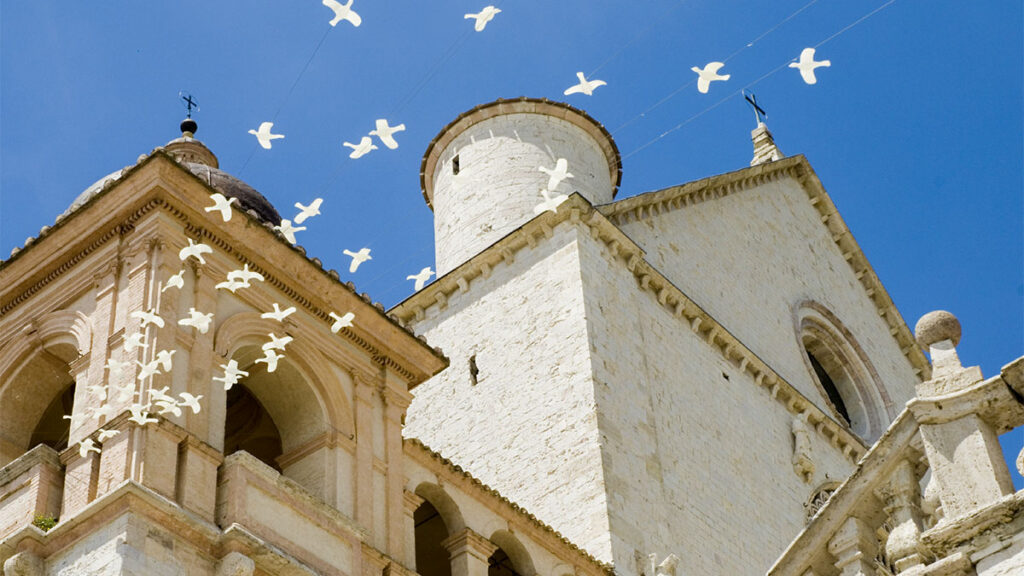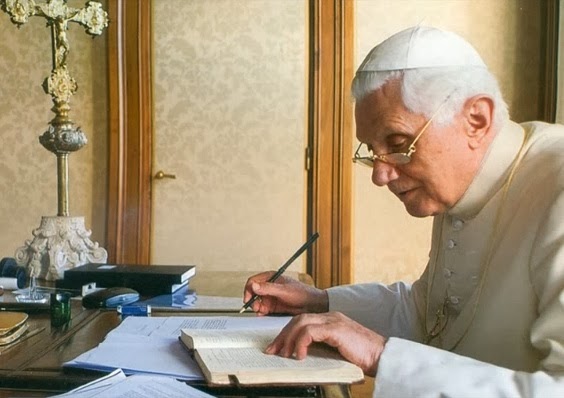In The Benedict Option: A Strategy for Christians in a Post-Christian Nation, Rod Dreher argues the future of Christianity lies in a monastic lifestyle not unlike the monasticism fathered by the medieval monk Benedict.
In Dreher’s thinking, the dominant secular culture has become so corrosive and corrupt that Christians should take to the hills, literally.
Dreher’s premise is appealing. Christians face a dire need for an effective strategy to address the challenges of the secular culture. Nonetheless, I found his analysis and his solution somewhat unconvincing.
A wholesale retreat into monasticism stands in opposition to the core mission of Christianity: the faithful have been commissioned to go forth to the ends of the earth to convert souls. They’re charged with the duty of bringing salvation to Mankind.
In fact, the emerging cultural imbalance we are experiencing today seems to be the result of Christianity’s steady retreat over the past two hundred years.
Perhaps a better solution is to redouble our efforts to engage the secular culture. Perhaps it is time for battle, not a time for retreat. Perhaps it is time for a noisy offensive. However, such a campaign, such engagement, is contingent on our ability to field an army of spiritual warriors.
The current absence of a fearsome fighting force may have motivated Dreher’s desire for a retreat behind monastery walls. If someone was unable to defend themselves, no doubt they would want to retreat.
Furthermore, I suspect Dreher’s theology does not serve him well. Perhaps the inability to wage successful battles is due, at least in part, to a deficit of sound theology.
This spiritual deficit is not a new phenomenon. For the past couple hundred years Christianity’s battle with secularism and materialism has been undermined by the lack of a robust theology. When Christian warriors discovered the weapons in their hands were insufficient, they retreated, feeling powerless to defend against the cultural assault.
Thus, we must understand that arming Christians with spiritual and theological weapons is a priority.

Franciscan spirituality, with roots in early church theology, may be the solution. Saint Bonaventure, a Franciscan, was enrolled at the Academy in Paris at the same time as Thomas Aquinas, the father of Scholasticism.
Bonaventure, however, departed Paris on a contemplative path, returning to the cave where Saint Francis spent time in hermitage. For Bonaventure, theology was empty without periods of contemplative prayer. (Later in his life, Aquinas also came to recognize the superiority of the mystical path.)
Hermitage was an integral part of the Franciscan tradition, beginning when Francis became torn between a life of monastic seclusion and a life of public preaching. Saint Clare convinced him to alternate between periods of hermitage and periods of public preaching.
For this reason, Franciscans became known as friars rather than monks. They were mendicants who went from village to village preaching and relying on the support of villagers.
This model—contemplative life infusing evangelism—has immense value today. It may best address Christians’ current woes. In this model, individuals enter into hermitage to procure spiritual weapons received through contemplative prayer and mystical union. They develop a sacred mindset sufficiently robust to engage in battle with the secular culture.

Thus, I suggest a different option: The Assisi Option.
In this approach, spiritual activists, men and women who have spent time in the crucible of contemplative prayer, will simply become known as contemplatives who engage in robust evangelism. Perhaps they will be part of the final Franciscan Order, a future Order that Pope Benedict XVI called a Seraphic Order, an angelic order dedicated to transforming the world through contemplative prayer.
During prayer such contemplatives will become infused with the Holy Spirit. They will undergo a spiritual transformation from “false self” to “divine self.” When they go forth two-by-two to minister, their state of being-in-love will convey truths of divine relationship. Infused with the Holy Spirit, they will be better able to lift the world with Spirit.
Contemplatives, after completing their hermitage, will go forth as peacemakers, like Saint Francis. The fruits of their reconciliation work will ripen all along the path they take through the fallen world. They will deliver healing and comfort through pastoral counseling.
They will console all they meet with the gospel message “be not afraid.” At the same time, they will deliver the sacred “look of love” that all people crave. They will preach, using words when necessary, conveying love and wisdom as they convert souls. They will lead the faithful on the path to salvation.
The light of their personal divine relationship will draw others into relationship with Christ. Those they encounter will follow their gaze to discover the miracle of the Real Presence.
During peacemaking, healing, and preaching, contemplatives will no doubt suffer wounds common to the spiritual battlefield. Repeated hermitages will be required. When they return to the cave to refresh their spirit, other contemplatives will take their place in ministering to the world.
Their evangelism will inspire other pilgrims to follow the contemplative way. The uninitiated will be guided to “the cave” to experience mystical union. After souls in hermitage rehabilitate their endowment of the image and likeness of God, they’ll be better prepared to rehabilitate a world suffering despair.
God’s presence in the world, shining through the demeanor of contemplatives, will illuminate sacramental signs. Blessed with contemplative vision in their midst, the faithful will find their spiritual vision improving. They, too, will see God’s presence in every creature.
The sacred task of evangelism will rest in the hands of those truly prepared. They will operate with a power that overcomes cultural challenges. Thus, the Assisi Option will place spiritual warriors on the cultural battlefield.
What will the Assisi Option look like in practice? First, a network of hermitage sites or spiritual direction centers will be established. These spiritual retreat centers will offer advanced spiritual direction and formation. They will specialize in applied theology.
This plan has an important precedent: during hermitage on Mount LaVerna, Francis and Bonaventure both found mystical union with Christ.
Their prayerful contemplation generated profound works on spirituality. They shared the wisdom they gained in contemplative prayer with people of distant lands. Out of the cave arose an applied theology that enabled people to see the divine within each other; out of the cave emerged a heavenly light that dispersed shadows.

Participants in the Assisi Option will not travel to exotic or remote locations, and they will not prepare for a monastic life. Rather, at the Assisi centers, they will seek the deep spiritual transformation that fosters mystical union. Once transformed, they will go forth into nearby communities as new disciples.
Contemplatives straddle this world and the next. They seek not only mystical union, but also the skills needed to rescue trapped souls. They train as peacemakers, reconcilers, and healers, and also as spiritual directors, pastoral counselors, preachers, teachers and evangelists. The great majority will be laypersons.
Contemplatives in the majority of cases, they will minister to the nearest church community. The majority will attend a nearby retreat center on a daily basis. At any one time from two to four members of a church community might participate in hermitage and training.
The depth of their spiritual formation and lived faith will enable them to grasp reality at its deepest level. They will marry faith and reason; they will convey the truth of the faith that very few have known. They will deconstruct cultural views that block man’s relationship with the divine.
Peacemaking skills will help them battle false views dominating the culture, they will defeat the death grip of materialistic atheism. Faulty viewpoints will wilt under their wisdom.
They will be prepared to transform viewpoints, but not with apologetics. Rather, they’ll bring the Peace of Christ to heal broken relationships. They’ll reconcile man’s relationship with God, imitating Christ the Mediator. They will foster the realization that “God is love.”

Contemplatives practicing applied theology based on Benedict XVI’s dialogical theology, will give loving testimony to Christ’s presence, that testimony will overcome the adversarial secular culture. Sacred knowledge will dismantle the falsehoods of a fallen world.
Rather than retreat to cloisters in the hills to watch from afar as the world experiences wholesale destruction, contemplatives, refreshed by periods of hermitage, will robustly engage the culture, starting with the Church.
Disciples in the new Seraphic Order will hasten the arrival of the “Peace of Christ” and the salvation of souls. These trained spiritual warriors will have no match in the worldly realm.
There is little time to spare. The Assisi Option should be implemented with all due haste. Let us not retreat; let us advance as spiritual warriors to meet today’s challenges. Let us not secret the faith away as though it were a prize we alone have won. Rather, let us light torches and go forth to fulfill our Great Commission.
Let us bring the living Gospel to all corners of the world.
Comments and Suggestions
If you have any comments or suggestions regarding the Assisi Option, please let us know. We would love to hear from you.
